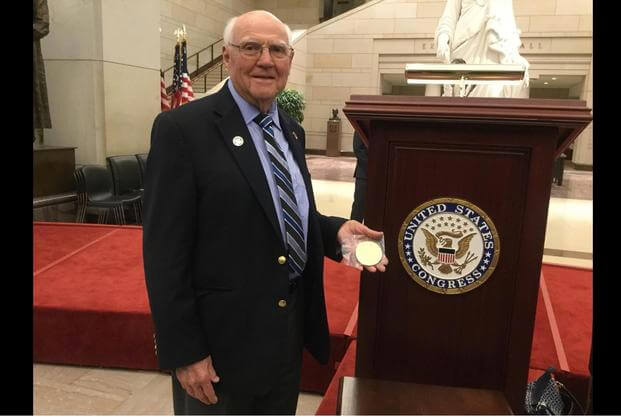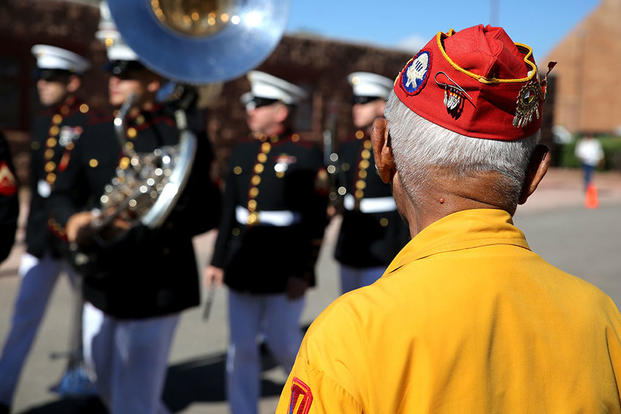And for more than 40 years after World War II ended, Army sergeant Keith Cole was forbidden from uttering a single word about what he saw and did. But on March 21, Cole and roughly 20 of his former colleagues in the Office of Strategic Services were ushered into the bright lights of the U.S. Capitol's Emancipation Hall to receive the Congressional Gold Medal, the nation's highest civilian award. "It was something I never thought would happen," says Cole, 93. The super-secret OSS, formed in 1942 to disrupt Axis operations via espionage and arming resistance groups, would become the forerunner to the Central Intelligence Agency, U.S. Special Operations Command and the State Department's Bureau of Intelligence and Research. It counted 13,000 personnel during the height of the war, with luminaries that would include future CIA directors William Colby, William Casey and Richard Helms, Nobel Peace Prize negotiator Ralph Bunche, Hollywood director John Ford, actors Sterling Hayden and Marlene Dietrich, and chef Julia Child. In fact, nearly one-third of the OSS agents were women.
By time the Gold Medal ceremonies got underway, an estimated 100 were still living. One of those -- Cole -- retired to Sarasota 26 years ago. The OSS operators were freed from their security oaths in 1987, but by then, says Cole, the war was old news and nobody much asked about what happened way back then. "We had no idea what he did in the war, so it came as a real surprise," says daughter Peggy Cole-Gibbons, visiting from her father's native Michigan. "We knew he was in the Army, we knew he was in England, but that was about it." Given the high levels of compartmentalization, Cole was almost as clueless about the scope of OSS operations as his daughter, at least until the gag order was rescinded. Then he began reading everything he could get his hands on. His own insights into the mission were narrow and restricted. No two missions were alike for 'Carpetbaggers' Cole joined the Army Air Corps at 17 with hopes of becoming a pilot, but poor eyesight kept him out of the $#@!pit.

Keith Cole of Sarasota, FL recently received a Congressional Gold Medal for his service in the Office of Strategic Services.
He wound up with the 492nd Bomb Group, which transferred to OSS operations in 1944 under the nickname "Carpetbaggers." Employing B-24 bombers stripped of most of its guns, missions involved flying out of England on moonlit nights, dropping below enemy radar coverage at 400 feet, and reaching rendezvous points as far away as Yugoslavia. As a dispatcher, Cole was positioned in the rear, and his job was to make sure the bombers unloaded their payloads directly over given coordinates. Whether ferrying canisters of supplies suspended from bomb bay shackles or saboteurs hoping their counterparts below would be waiting, no two missions were alike. Cole participated in nine drops, and never knew if they ended in success or failure. Flying too low and fast to be challenged by enemy warplanes or ground fire was no guarantee against catastrophe, however. Cole says several Carpetbagger crews were lost after slamming into high hills. But it was only on V-E Day, when he got a daytime bird's-eye view of Europe, did Cole realize what he'd been spared from his quarters across the Channel. "We actually spent two days flying over France and Germany, Belgium, Holland, looking at the total destruction of the war," Cole recalls. "You'd go over rivers and there were no bridges left at all, or none that I could see. You could tell where there had been a tank battle, there 8 or 10 dead tanks in a row, or you'd see pockets of anti-aircraft batteries that had been abandoned and were still standing. It was absolute devastation."
For the elderly OSS agents who didn't know each other existed until last week's reunion in Washington, D.C., the extent to which their efforts helped shorten the war will never be known. But sometimes special operations function best when they're hiding in plain sight, says Cole. "I used to listen to the BBC news every night, and I found out later that the first few words in every broadcast contained coded messages to resistance forces about who was going to was going to receive supplies that night, things like 'Uncle Jean has two shillings in his pocket' and 'Tell Marie to wear her galoshes,'" he says. "I think that's pretty interesting."
https://www.military.com/off-duty/20...ded-valor.html


 The Law and Justice Room
The Law and Justice Room




 Reply With Quote
Reply With Quote